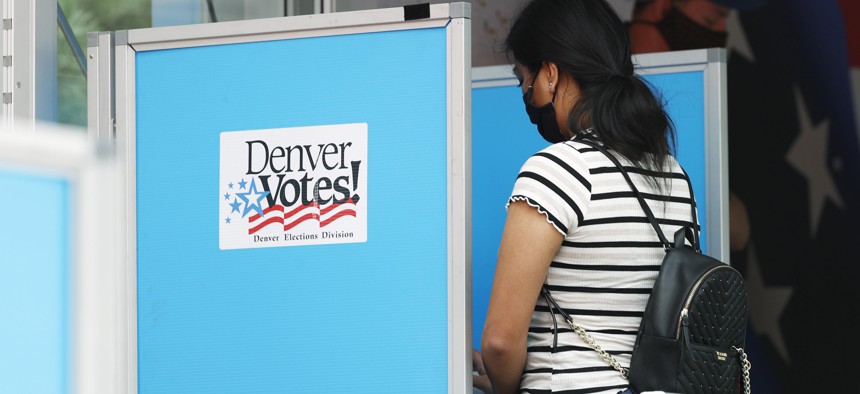Paid Leave Measure to Appear on Colorado Ballot This November

A voter casts a ballot in Denver during Colorado's June 2020 primary election. AP Photo/David Zalubowsk
The medical and family leave program would be funded by a tax paid by employers and workers in the state. Eight other states now have similar programs in place.
Colorado voters will get to decide this fall on whether the state should create a paid family and medical leave insurance program that would provide most eligible workers as much as $1,100 a week for up to 12 weeks a year so they can more easily afford to take time off when having a child, caring for a sick family member or dealing with a serious health condition themselves.
The secretary of state’s office in Colorado said Tuesday that a ballot measure—Initiative 283—proposing the program had qualified for the November ballot. Funding for the program would come from a new “premium” payment—effectively a payroll tax. The cost of the tax would be split 50-50 by employers and employees, with the rate initially set at 0.9% of wages per employee.
Colorado Families First, a campaign committee that is backing the measure and pushed to get it on the ballot, has reported about $2.6 million in contributions this year, with much of that money coming from the Sixteen Thirty Fund, a D.C.-based nonprofit that spent heavily in the 2018 midterm elections to support liberal-leaning causes.
Eight states and Washington D.C. have passed laws to create paid family and medical leave insurance programs, but three—Massachusetts, Connecticut, and Oregon—won’t start paying benefits until next year, or later, according to the National Conference of State Legislatures. The other states with programs on the books include California, New Jersey, Rhode Island, New York and Washington.
California was the first state to approve a paid family leave law, back in 2002. State figures show that, in 2019, paid claims through the program averaged around 23,000 a month (the state has about 39 million residents) and that the average duration for the leave people took was around five and a half weeks.
In Colorado, workers and employers would begin paying to fund the proposed program on Jan. 1, 2023. Estimates from nonpartisan staff for the state legislature indicate that the premiums would raise $626 million in fiscal 2022-23 and $1.3 billion in fiscal 2023-24.
As proposed, the program would replace 90% of a worker’s average weekly pay for wages up to 50% of the state’s average weekly wage, and 50% for wages above that level, with all payments subject to an $1,100 weekly benefit cap through at least 2025.
Benefits would be available for up to 16 weeks, instead of the standard 12, for women with serious health conditions related to complications with pregnancy or childbirth.
Starting in 2025, officials overseeing the program would be required to set premium rates with the aim of having contributions equal to 135% of the prior year’s claims, plus program administration costs.
The measure also calls for authorizing the state to issue bonds backed by revenues flowing to the program to help cover expenses.
Businesses with fewer than 10 employees would be exempt from paying the employer premium. The state and local governments in Colorado would be included, but local governments, including school districts, could choose to opt-out.
Supporters of the initiative submitted 205,660 petition signatures, more than the 124,632 needed to qualify for inclusion on the ballot, the secretary of state’s office said.
Proponents of the measure say that workers should not have to face losing pay, and potentially having difficulty paying their bills, when deciding to take time off to care for a seriously ill family member or to have time to spend with a new baby.
Federal law entitles eligible employees nationwide to take up to 12 weeks of unpaid leave for specified medical and family reasons, including the birth of a child. Some companies opt to offer more generous policies, but these vary.
Democratic lawmakers in Colorado have pushed to pass legislation along the lines of the ballot measure, but haven’t been successful.
A campaign opposed to the measure, Not Now Colorado, has so far reported only a $25,000 donation from the Denver Metro Chamber.
The group characterizes the program as “lavish” and says it would be risky to levy the premiums needed to fund it at a time when the nation’s economy still hasn’t recovered from the economic damage caused by the coronavirus. Opponents also raise concerns about the financial sustainability of the program in the years ahead.
Democrats in Colorado performed strongly in the 2018 election and now control both chambers of the legislature and the governor’s mansion. But residents in the state have generally been reluctant in recent years to vote for measures that would raise their taxes.
Bill Lucia is a senior reporter for Route Fifty and is based in Olympia, Washington.
NEXT STORY: State Lawmakers Advance Bills to Protect Workers and Residents at Nursing Homes






